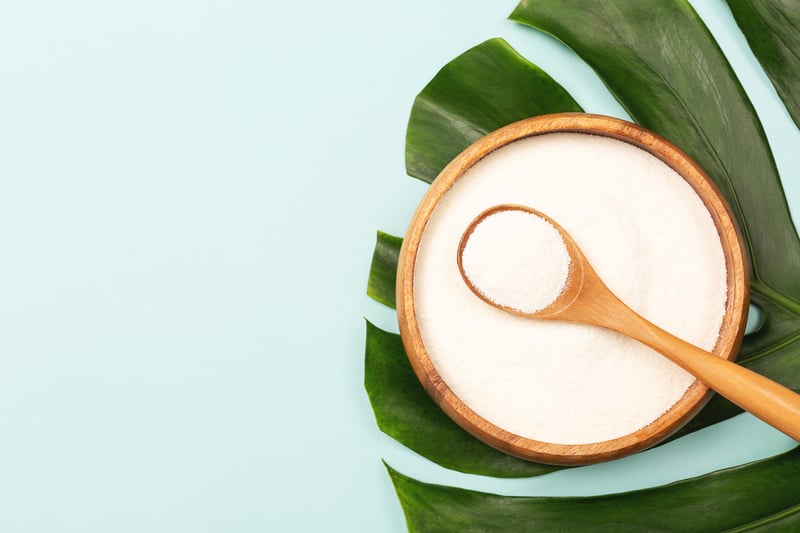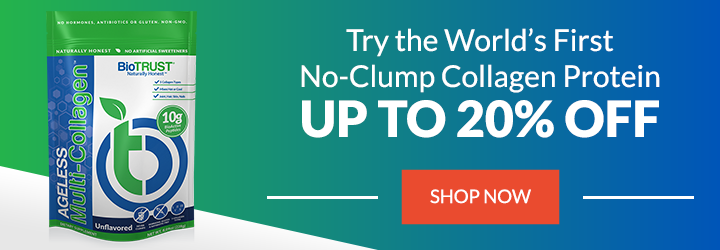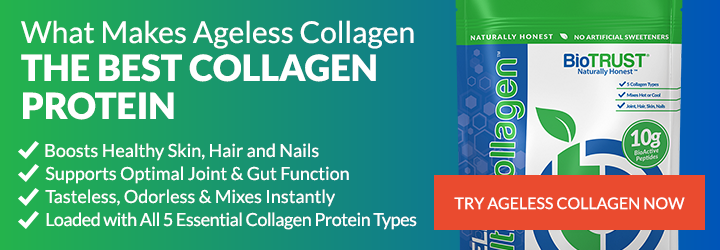Is Collagen Protein Good for You (or just marketing hype)?

In a time when we are all searching for the truth, it’s hard to know what to believe anymore! Today’s day and age is filled with an overabundance of media sources, all intensely competing for our attention, making it harder to filter out the fluff and get straight to the facts. After all, the facts and the science are really all that matters—especially when it comes down to the big, important, and dare I say, life-changing decisions.
I am talking about COLLAGEN. What else did you think I was talking about? Okay, so maybe your decision on collagen isn’t the biggest, most important choice you are making day to day. But with so many people advertising its miracle effects, it’s easy to be convinced that it might be the end all, be all—at least when it comes to nutrition.
Collagen is regularly touted as the modern-day fountain of youth, benefiting everything from skin to hair to nails to joints to gut to immunity to mood to longevity to… you name it. But can a simple protein really produce all those benefits? Like many, I am determined to find out. When it comes to what others claim I should be putting in my body, I always tend to waver on the side of skepticism. I’ve always believed if it sounds too good to be true, it probably is, which subsequently leads us to dig into the science and sort out the facts.
What is Collagen?
Collagen is a protein, and like all proteins, it is made up of amino acids. Amino acids are built out of carbon, oxygen, and hydrogen and are the building blocks of the body. Specifically, collagen mainly contains glycine, proline, and hydroxyproline. Although its structure may suggest collagen is your basic protein, it is anything but simple.
Collagen is a vital component to the body. So much so, collagen actually composes about a third of all the protein in the human body, making it one of the most abundant substances in your body. To put things a little bit more into perspective, collagen makes up 70% of the protein in the body’s largest organ, our skin.
Undoubtedly, with the body’s extensive demand for collagen, it is naturally produced. However, the body’s ability to produce collagen naturally decreases as we age, beginning as early as age 25. Even more, external factors such as sun exposure, smoking, and poor diet can inhibit collagen production. This realization of the reduction in our natural collagen production has thus spiked interest in the market of collagen supplementation. But this leads us right into the main topic of discussion: Is collagen protein good for you (or just marketing hype)? Let’s see the science.
Is Collagen Protein Good For You?
Much of the research on collagen benefits has fixated on its potential for improving joint health. This makes sense as collagen accounts for 70 – 80% of the dry weight in ligaments. 1 In small trials, oral collagen supplementation has been shown to help reduce exercise-related joint pain among healthy adults. 2,3 Other studies have also found it may help reduce activity-related joint pain among athletes. 4,5 And for aging joints, a 2018 review found that hydrolyzed collagen supplements may provide relief from pain. 6
Another major focus in collagen research has been on skin health. This is because, as previously mentioned, collagen is the most plentiful protein in the skin. Research has shown that adding collagen into the diet may improve the skin’s hydration and elasticity. A double-blind, randomized, placebo-controlled trial found through the analysis of skin biopsies that daily oral supplementation with collagen may result in a significant improvement in skin elasticity. Another placebo-controlled trial found that supplementation with collagen peptides for eight weeks may significantly improve skin hydration and increase collagen density in the skin, while also reducing collagen fragmentation. 8
Collagen is also thought to aid in maintaining bone health and guarding against bone loss. That is, collagen peptides have been shown to stimulate the cells that synthesize bone. 9,10 Additionally, a handful of trials suggest that collagen supplementation may help improve bone mass and prevent bone loss. 11,12
Among other benefits relating to collagen are that it supports hair, nail, and gut health. One study found that consumption of collagen peptides increased nail growth and decreased nail brittleness and breakage. 13 Collagen is also a primary component of the cells in the gut lining.
Without question, the science is there to support the healthful benefits of collagen. But there is still more to uncover to really determine if all the collagen out on the market is as good for you as they say they are or if they just seek to tag along on the collagen bandwagon. Of course, not all supplements are created equal, and this becomes especially true as collagen varies in both source and type. Here is a closer look at the most important types of collagen.
The Most Important Types of Collagen
Type I Collagen: Most of the collagen found in the body is composed of Type I collagen. This type of collagen can be found in the skin, bones, connective tissue, and blood vessels. 14 As a result, this type of collagen is most widely recognized for its anti-aging properties. Deficiencies in Type I collagen are most recognizable by the appearance of sagging skin and wrinkles. 15
Type II Collagen: This type of collagen is recognized for supporting joint health. This is because Type II can be found in much of the elastic cartilage in the body. Additionally, Type II collagen is the most efficiently absorbed type of collagen.
Type III Collagen: Type III is the second most prevalent in the body as it provides structure for muscles, organs, and blood vessels. As such, Type III collagen supports healthy blood clotting as well as aids in muscle growth. 16
Type V Collagen: This type of collagen is found in most intestinal tissue as well as in skin, hair, and the cornea of the eye. However, one of the most important places Type V can be found is in the placenta as it is essential for neonatal development. 17 Becoming deficient in Type V collagen is associated with a decline in eye health and decreased transparency in the cornea, which can impair vision. 18
Type X Collagen: Type X collagen is primarily found in cartilage. Type X collagen is thought to play a role in providing mineralization and structural support for articular cartilage. Further, it is essential to bone growth and is considered a good biomarker for new bone growth. 19,20
These 5 types of collagen are critical when considering a collagen protein supplement. So, if you want to make sure you are interested in a collagen supplement that you are getting the best collagen to benefit the most areas of your body. Therefore, it’s essential to get all five of these key types.
Complete Collagen Protein
As you may remember, not all powders and supplements are created the same. Finding a brand you can trust is challenging, which is why I suggest BioTRUST Ageless Multi-Collagen Powder™. Ageless Multi-Collagen is a best-in-class collagen protein, which contains all 5 types of collagen and is third-party tested for purity and potency. Not only that, Ageless Multi-Collagen provides the scientifically correct proportions to gain the maximum benefit from collagen and experience powerful results, and that’s a big reason why Ageless Multi-Collagen powder is lightyears ahead of so many other collagen powders.
With that, we have reached the final conclusion on the big question. Collagen is more than just marketing hype. It is, in fact, very good for you! However, this just scratches the surface of all the data out there in the expanding world of collagen, so if you’re itching to learn more, I invite you to research further. Finding the facts is at the foundation of learning and making good decisions, so share your findings with us: We would love to learn from you too!







